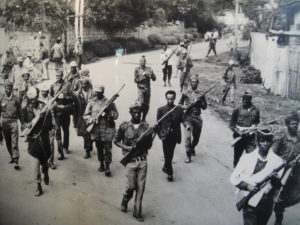
Door-to-door searches by Red Terror Troops to hunt down opposition members
After years on the run to evade justice, a member of former Ethiopian ruler Mengistu Haile Mariam’s Government faces trial for his role in the 1970s genocide in the country.
Eshetu Alemu’s trial began in The Hague on 21 November 2016.
Eshetu Alemu is brought to trial for war crimes committed in Ethiopia during the Mengistu era in Gojjam Province. This case is the result of a year-long investigation. Even if Ethiopia has requested extradition there is no treaty to that effect.
Eshetu Alemu has Ethiopian origin but also holds the Dutch nationality. He was serving as a member of the Provisional Military Administrative Council during the reign of the Derg, the Coordinating Committee of the Armed Forces, Police, and Territorial Army that ruled Ethiopia from 1974 to 1987 and which elected Mengistu Haile Mariam’s as its chairman.
He has already been convicted and sentenced to death in absentia in Ethiopia on December 12, 2006 by the Derg-Tribunal in its 12 years ‘Red Terror’ trials, during which former President Mengistu was also convicted for genocide. Eshetu Alemu was among the dozens of the dreaded council’s members who fled into exile. Continue reading

 by Rishi Gulati and Matthew Nelson*
by Rishi Gulati and Matthew Nelson*